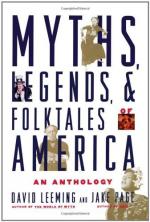|
This section contains 4,805 words (approx. 17 pages at 300 words per page) |

|
SOURCE: "Constance Rourke and the Folk Sources of American Literature," in Western Folklore, Vol. XXVI, No. 2, April, 1967, pp. 77-87.
In the following essay, Bluestein examines the methodology of, and resulting themes in, Constance Rourke's American Humor.
With one exception, very little analysis of the method and approach of Constance Rourke has appeared since her death in 1941.1 In an otherwise sympathetic essay, Stanley Edgar Hyman finds her work flawed because, unlike Jane Harrison, Miss Rourke did not follow the clues in her materials to their ultimate source in myth and ritual. It is a little like criticizing Mark Twain because he was not William Shakespeare. Her interests lay in other directions, and, with the publication of American Humor, A Study of the National Character (1931), Miss Rourke focused her attention on two major issues: the folk sources of an American literary tradition and the function of humor in its development...
|
This section contains 4,805 words (approx. 17 pages at 300 words per page) |

|


